Unit5 Languages around the world Grammmar 定语从句Ⅱ 课件(15张)
文档属性
| 名称 | Unit5 Languages around the world Grammmar 定语从句Ⅱ 课件(15张) | 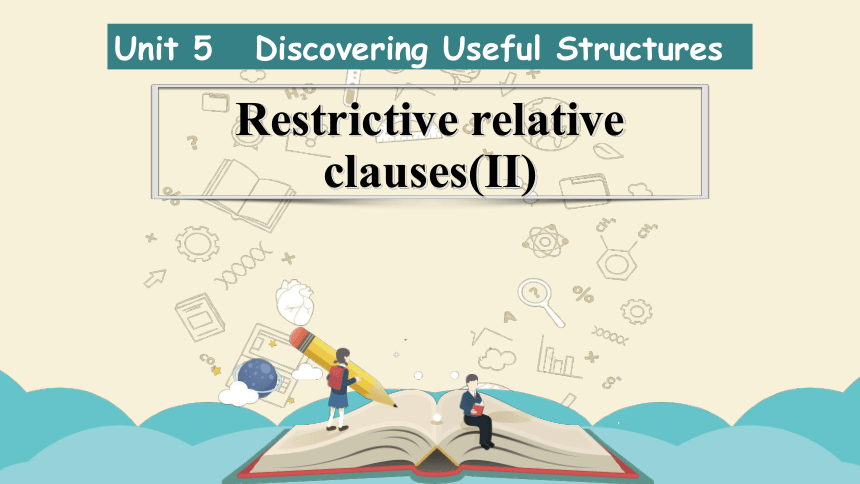 | |
| 格式 | pptx | ||
| 文件大小 | 576.0KB | ||
| 资源类型 | 教案 | ||
| 版本资源 | 人教版(2019) | ||
| 科目 | 英语 | ||
| 更新时间 | 2021-10-06 12:07:07 | ||
图片预览

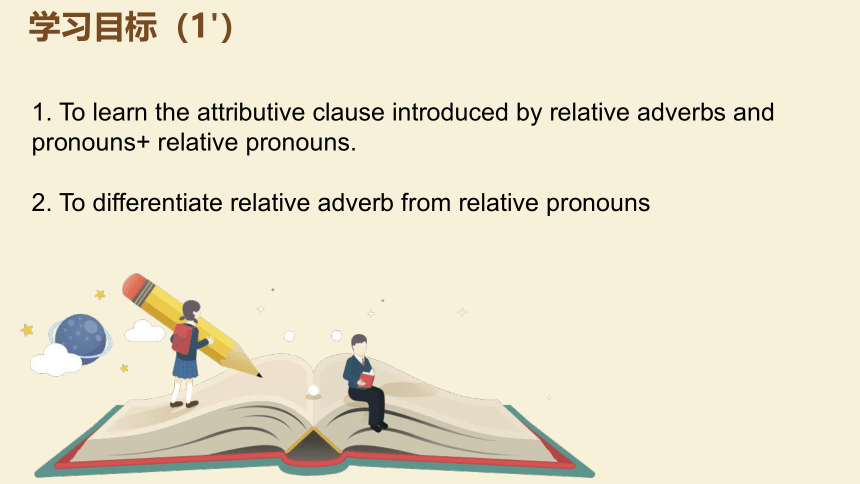
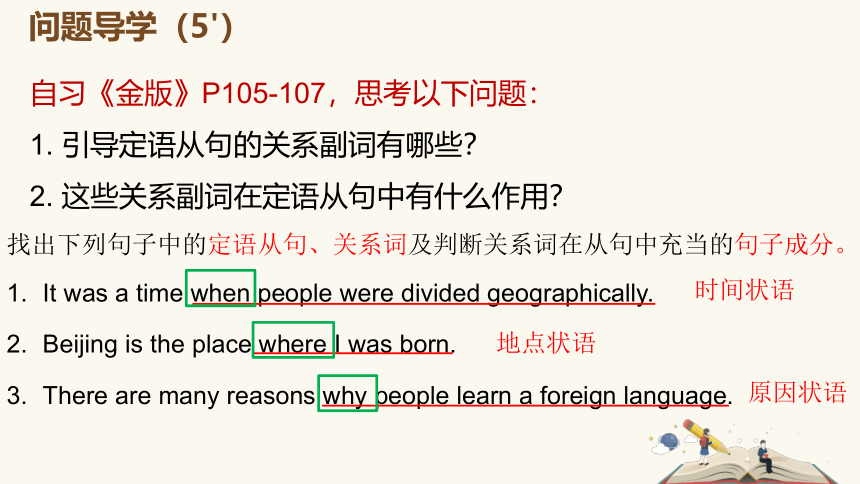
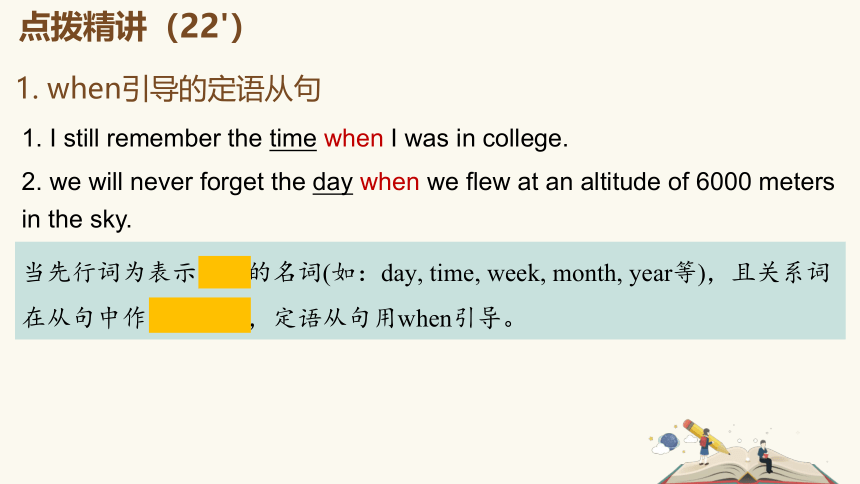
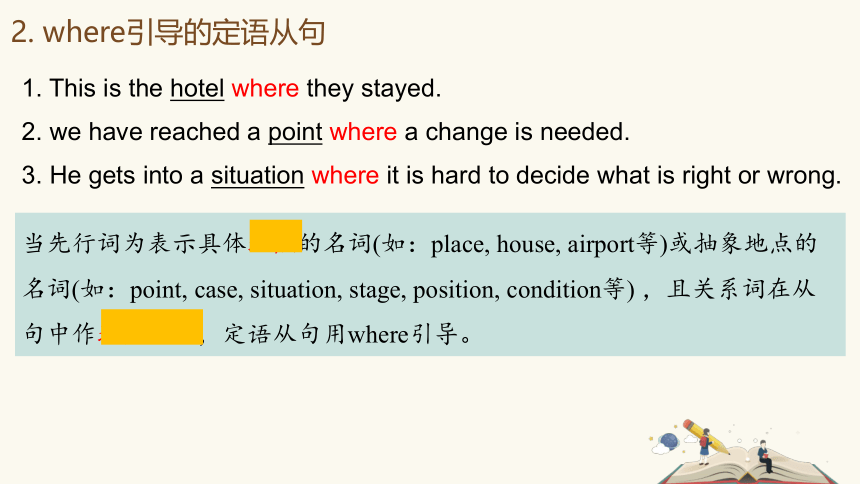
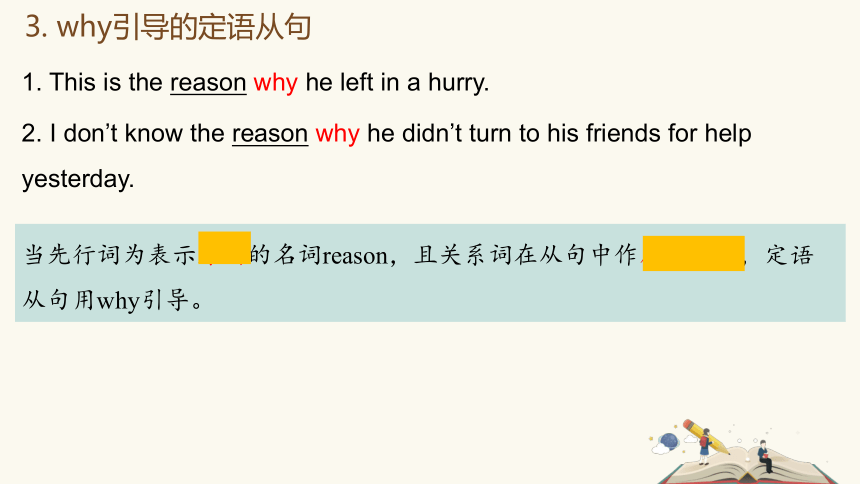
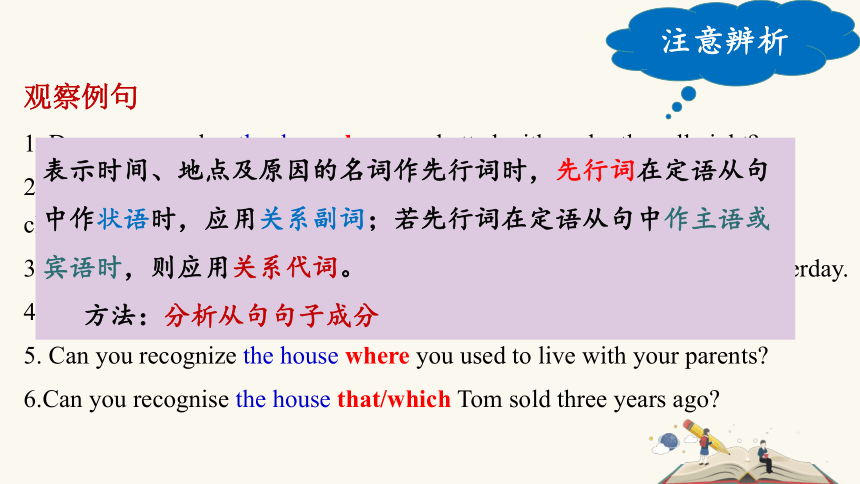
文档简介
(共15张PPT)
Restrictive
relative
clauses(Ⅱ)
Unit
5
Discovering
Useful
Structures
学习目标(1')
1.
To
learn
the
attributive
clause
introduced
by
relative
adverbs
and
pronouns+
relative
pronouns.
2.
To
differentiate
relative
adverb
from
relative
pronouns
找出下列句子中的定语从句、关系词及判断关系词在从句中充当的句子成分。
It
was
a
time
when
people
were
divided
geographically.
Beijing
is
the
place
where
I
was
born.
There
are
many
reasons
why
people
learn
a
foreign
language.
问题导学(5')
时间状语
地点状语
原因状语
自习《金版》P105-107,思考以下问题:
1.
引导定语从句的关系副词有哪些?
2.
这些关系副词在定语从句中有什么作用?
点拨精讲(22')
当先行词为表示时间的名词(如:day,
time,
week,
month,
year等),且关系词在从句中作时间状语,定语从句用when引导。
1.
I
still
remember
the
time
when
I
was
in
college.
2.
we
will
never
forget
the
day
when
we
flew
at
an
altitude
of
6000
meters
in
the
sky.
1.
when引导的定语从句
当先行词为表示具体地点的名词(如:place,
house,
airport等)或抽象地点的名词(如:point,
case,
situation,
stage,
position,
condition等)
,且关系词在从句中作地点状语,定语从句用where引导。
1.
This
is
the
hotel
where
they
stayed.
2.
we
have
reached
a
point
where
a
change
is
needed.
3.
He
gets
into
a
situation
where
it
is
hard
to
decide
what
is
right
or
wrong.
2.
where引导的定语从句
当先行词为表示原因的名词reason,且关系词在从句中作原因状语,定语从句用why引导。
1.
This
is
the
reason
why
he
left
in
a
hurry.
2.
I
don’t
know
the
reason
why
he
didn’t
turn
to
his
friends
for
help
yesterday.
3.
why引导的定语从句
观察例句
1.
Do
you
remember
the
days
when
we
chatted
with
each
other
all
night
2.
Do
you
remember
the
days
that/which
we
spent
studying
together
in
the
classroom
3.
I
don't
know
the
reason
why
he
didn't
turn
to
his
good
friend
for
help
yesterday.
4.
We
won't
accept
the
reason
that/which
you
have
given.
5.
Can
you
recognize
the
house
where
you
used
to
live
with
your
parents
6.Can
you
recognise
the
house
that/which
Tom
sold
three
years
ago
注意辨析
表示时间、地点及原因的名词作先行词时,先行词在定语从句中作状语时,应用关系副词;若先行词在定语从句中作主语或宾语时,则应用关系代词。
方法:分析从句句子成分
1.
when相当于“
at/in/on/during等
+
which”
I
remember
the
day
when
(=on
which)
I
settled
in
China.
2.
where
相当于“
in/at/on等
+
which”
The
house
where
(=in
which)
Mark
lived
is
now
a
library.
3.
why
相当于“for
+
which”
Is
that
the
reason
why
(=for
which)
she
suddenly
changed
her
mind
4.
“介词+关系代词”引导的定语从句
1.
关系副词when,where,why引导定语从句时,也可用“介词+which”代替关系副词。
1.
This
is
the
student
for
whom
I
bought
a
book.
2.
This
is
the
ship
by
which
I
went
to
Shanghai.
2.
在“介词+关系代词”引导的定语从句中,关系代词只能用which或whom,不可用that/who。先行词指物时用which,先行词指人时用whom。
3.
“名词,不定代词或数词
+
of
+
which
(指物)/whom
(指人)”在定语从句中作主语,说明整体中的一部分。
1.
China
has
lots
of
islands,
one
of
which
is
Hainan
Island.
2.
The
building
had
been
repaired,
the
roof
of
which
was
destroyed
again
in
a
big
fire.
3.
Miss
Liu
has
a
lot
of
students,
some
of
whom
are
girls.
(二)选用介词的依据
1.
根据先行词的搭配或从句中的动词、形容词等的搭配(即固定短语)。
(1)Yesterday
we
visited
the
West
Lake
for
which
Hangzhou
is
famous.
(2)
He
is
the
student
from
whom
we
should
learn.
(3)
I
remember
the
days
during
which
I
lived
here.
(4)
I
can’t
remember
the
age
at
which
he
won
the
prize.
2.
根据句子的意思来选择。
(1)
This
is
the
pilot
with
whom
my
brother
has
worked
for
ten
years.
(2)
This
is
the
pilot
by
whom
my
son
was
saved.
课堂小结(2')
关系副词
用法
注意:一些表示抽象地点的名词,如
point,case,position,condition,situation等
用where
引导
when
where
why
指时间,在定语从句中充当时间状语
指地点,在定语从句中作地点状语
指原因,在定语从句中作原因状语
当堂检测(15')
用恰当的关系代词,关系副词或“介词+关系代词”完成句子。
1.
The
days
are
gone
_______
physical
strength
was
all
you
needed
to
make
a
living.
2.
The
USA
is
a
country
______
many
different
dialects
are
spoken.
3.
The
reason
_______
he
explained
at
the
meeting
sounds
reasonable.
4.
It’s
helpful
to
put
children
in
a
situation
_____
they
can
see
themselves
differently.
5.
I
saw
a
house,
the
windows
of
______
were
broken.
6.
She
has
two
sons,
both
of
_____
graduated
from
Harvard
University.
7.
—
Do
you
have
anything
to
say
for
yourself
—
Yes.
There
is
one
point
_________
I
must
insist
on.
8.
—
What
do
you
think
of
teaching,
Bob
—
It
is
a
job
____________
you
are
doing
something
serious
but
interesting.
9.
It
was
in
the
village
______
he
once
lived
that
he
got
his
junior
education.
10.
We
have
entered
into
an
age
_____
dreams
have
the
best
chance
of
coming
true.
when
where
that/which
where
which
whom
which/that
where/in
which
where
when
合并句子
1.
My
hometown
has
taken
on
a
new
look.
I
spent
most
of
my
childhood
there.
2. Do you remember the day On that day we played
together.
3. The reason is unknown. He carried a first-aid kit.
4. We’ll go to hear the famous singer. We have often talked
about the famous singer.
5. The plane is very comfortable. We flew to Beijing in the
plane.
6.
There
are
sixty
students
in
our
class.
Thirty
of
the
students
in
our
class
are
boys.
7.
We
settled
down
in
a
small
village.
In
front
of
the
village
ran
a
winding
river.
My
hometown
,
where
I
spent
most
of
my
childhood,
has
taken
on
a
new
look.
Do you remember the day
when we played
together
The reason
why
he carried a first-aid kit
is unknown.
We’ll go to hear the famous singer
about
whom we have often talked.
The plane in
which
we flew to Beijing is very comfortable.
There
are
sixty
students
in
our
class,
thirty
of
whom
are
boys.
We
settled
down
in
a
small
village,
in
front
of
which
ran
a
winding
river.
California,
______
official
nick-name
is
the
Golden
State,
is
one
of
the
fastest
growing
states
in
the
United
States.
The
first
people
_____
explored
and
settled
in
California
were
the
Spaniards,
_____
gave
Spanish
names
to
its
two
great
cities,
Los
Angeles
and
San
Francisco.
1849
was
the
year
_____
Americans
came
and
also
the
time
______
gold
was
discovered.
The
reason
_____
the
men
_____made
movies
came
to
California
was
____
the
weather
here
is
fine.
The
sun
allowed
them
to
take
pictures
outdoors
nearly
every
day
in
the
year.
Hollywood,
_____lies
in
the
northwestern
part
of
he
city
of
Los
Angeles
the
movie
capital
of
the
world.
When
oil
was
discovered.
People
came
to
work
in
the
oil
field
World
War
I
was
the
period
______
many
large
airplane
factories
were
built
in
California.
whose
that
when
who
which
when
that
who
why
when
THANK
YOU
Restrictive
relative
clauses(Ⅱ)
Unit
5
Discovering
Useful
Structures
学习目标(1')
1.
To
learn
the
attributive
clause
introduced
by
relative
adverbs
and
pronouns+
relative
pronouns.
2.
To
differentiate
relative
adverb
from
relative
pronouns
找出下列句子中的定语从句、关系词及判断关系词在从句中充当的句子成分。
It
was
a
time
when
people
were
divided
geographically.
Beijing
is
the
place
where
I
was
born.
There
are
many
reasons
why
people
learn
a
foreign
language.
问题导学(5')
时间状语
地点状语
原因状语
自习《金版》P105-107,思考以下问题:
1.
引导定语从句的关系副词有哪些?
2.
这些关系副词在定语从句中有什么作用?
点拨精讲(22')
当先行词为表示时间的名词(如:day,
time,
week,
month,
year等),且关系词在从句中作时间状语,定语从句用when引导。
1.
I
still
remember
the
time
when
I
was
in
college.
2.
we
will
never
forget
the
day
when
we
flew
at
an
altitude
of
6000
meters
in
the
sky.
1.
when引导的定语从句
当先行词为表示具体地点的名词(如:place,
house,
airport等)或抽象地点的名词(如:point,
case,
situation,
stage,
position,
condition等)
,且关系词在从句中作地点状语,定语从句用where引导。
1.
This
is
the
hotel
where
they
stayed.
2.
we
have
reached
a
point
where
a
change
is
needed.
3.
He
gets
into
a
situation
where
it
is
hard
to
decide
what
is
right
or
wrong.
2.
where引导的定语从句
当先行词为表示原因的名词reason,且关系词在从句中作原因状语,定语从句用why引导。
1.
This
is
the
reason
why
he
left
in
a
hurry.
2.
I
don’t
know
the
reason
why
he
didn’t
turn
to
his
friends
for
help
yesterday.
3.
why引导的定语从句
观察例句
1.
Do
you
remember
the
days
when
we
chatted
with
each
other
all
night
2.
Do
you
remember
the
days
that/which
we
spent
studying
together
in
the
classroom
3.
I
don't
know
the
reason
why
he
didn't
turn
to
his
good
friend
for
help
yesterday.
4.
We
won't
accept
the
reason
that/which
you
have
given.
5.
Can
you
recognize
the
house
where
you
used
to
live
with
your
parents
6.Can
you
recognise
the
house
that/which
Tom
sold
three
years
ago
注意辨析
表示时间、地点及原因的名词作先行词时,先行词在定语从句中作状语时,应用关系副词;若先行词在定语从句中作主语或宾语时,则应用关系代词。
方法:分析从句句子成分
1.
when相当于“
at/in/on/during等
+
which”
I
remember
the
day
when
(=on
which)
I
settled
in
China.
2.
where
相当于“
in/at/on等
+
which”
The
house
where
(=in
which)
Mark
lived
is
now
a
library.
3.
why
相当于“for
+
which”
Is
that
the
reason
why
(=for
which)
she
suddenly
changed
her
mind
4.
“介词+关系代词”引导的定语从句
1.
关系副词when,where,why引导定语从句时,也可用“介词+which”代替关系副词。
1.
This
is
the
student
for
whom
I
bought
a
book.
2.
This
is
the
ship
by
which
I
went
to
Shanghai.
2.
在“介词+关系代词”引导的定语从句中,关系代词只能用which或whom,不可用that/who。先行词指物时用which,先行词指人时用whom。
3.
“名词,不定代词或数词
+
of
+
which
(指物)/whom
(指人)”在定语从句中作主语,说明整体中的一部分。
1.
China
has
lots
of
islands,
one
of
which
is
Hainan
Island.
2.
The
building
had
been
repaired,
the
roof
of
which
was
destroyed
again
in
a
big
fire.
3.
Miss
Liu
has
a
lot
of
students,
some
of
whom
are
girls.
(二)选用介词的依据
1.
根据先行词的搭配或从句中的动词、形容词等的搭配(即固定短语)。
(1)Yesterday
we
visited
the
West
Lake
for
which
Hangzhou
is
famous.
(2)
He
is
the
student
from
whom
we
should
learn.
(3)
I
remember
the
days
during
which
I
lived
here.
(4)
I
can’t
remember
the
age
at
which
he
won
the
prize.
2.
根据句子的意思来选择。
(1)
This
is
the
pilot
with
whom
my
brother
has
worked
for
ten
years.
(2)
This
is
the
pilot
by
whom
my
son
was
saved.
课堂小结(2')
关系副词
用法
注意:一些表示抽象地点的名词,如
point,case,position,condition,situation等
用where
引导
when
where
why
指时间,在定语从句中充当时间状语
指地点,在定语从句中作地点状语
指原因,在定语从句中作原因状语
当堂检测(15')
用恰当的关系代词,关系副词或“介词+关系代词”完成句子。
1.
The
days
are
gone
_______
physical
strength
was
all
you
needed
to
make
a
living.
2.
The
USA
is
a
country
______
many
different
dialects
are
spoken.
3.
The
reason
_______
he
explained
at
the
meeting
sounds
reasonable.
4.
It’s
helpful
to
put
children
in
a
situation
_____
they
can
see
themselves
differently.
5.
I
saw
a
house,
the
windows
of
______
were
broken.
6.
She
has
two
sons,
both
of
_____
graduated
from
Harvard
University.
7.
—
Do
you
have
anything
to
say
for
yourself
—
Yes.
There
is
one
point
_________
I
must
insist
on.
8.
—
What
do
you
think
of
teaching,
Bob
—
It
is
a
job
____________
you
are
doing
something
serious
but
interesting.
9.
It
was
in
the
village
______
he
once
lived
that
he
got
his
junior
education.
10.
We
have
entered
into
an
age
_____
dreams
have
the
best
chance
of
coming
true.
when
where
that/which
where
which
whom
which/that
where/in
which
where
when
合并句子
1.
My
hometown
has
taken
on
a
new
look.
I
spent
most
of
my
childhood
there.
2. Do you remember the day On that day we played
together.
3. The reason is unknown. He carried a first-aid kit.
4. We’ll go to hear the famous singer. We have often talked
about the famous singer.
5. The plane is very comfortable. We flew to Beijing in the
plane.
6.
There
are
sixty
students
in
our
class.
Thirty
of
the
students
in
our
class
are
boys.
7.
We
settled
down
in
a
small
village.
In
front
of
the
village
ran
a
winding
river.
My
hometown
,
where
I
spent
most
of
my
childhood,
has
taken
on
a
new
look.
Do you remember the day
when we played
together
The reason
why
he carried a first-aid kit
is unknown.
We’ll go to hear the famous singer
about
whom we have often talked.
The plane in
which
we flew to Beijing is very comfortable.
There
are
sixty
students
in
our
class,
thirty
of
whom
are
boys.
We
settled
down
in
a
small
village,
in
front
of
which
ran
a
winding
river.
California,
______
official
nick-name
is
the
Golden
State,
is
one
of
the
fastest
growing
states
in
the
United
States.
The
first
people
_____
explored
and
settled
in
California
were
the
Spaniards,
_____
gave
Spanish
names
to
its
two
great
cities,
Los
Angeles
and
San
Francisco.
1849
was
the
year
_____
Americans
came
and
also
the
time
______
gold
was
discovered.
The
reason
_____
the
men
_____made
movies
came
to
California
was
____
the
weather
here
is
fine.
The
sun
allowed
them
to
take
pictures
outdoors
nearly
every
day
in
the
year.
Hollywood,
_____lies
in
the
northwestern
part
of
he
city
of
Los
Angeles
the
movie
capital
of
the
world.
When
oil
was
discovered.
People
came
to
work
in
the
oil
field
World
War
I
was
the
period
______
many
large
airplane
factories
were
built
in
California.
whose
that
when
who
which
when
that
who
why
when
THANK
YOU
